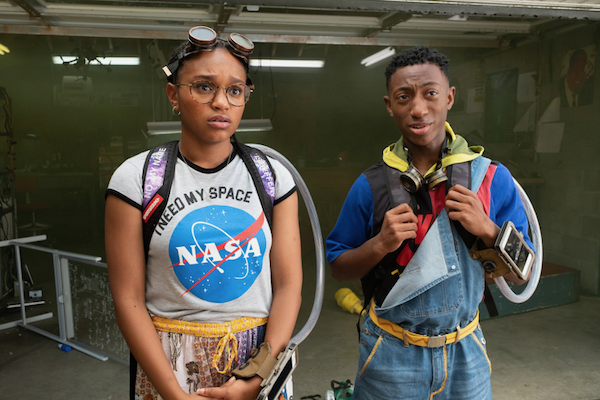Movie review by Greg Carlson
Fargo-based filmmaker Matthew Myers recently remarked that director Stefon Bristol was, among other things, paying his bills by driving for Uber until production began on “See You Yesterday,” Bristol’s exciting debut feature. Myers produced the movie with Jason Sokoloff and Spike Lee, a professor to Bristol in the graduate film program at NYU. Bristol, who made a short version of “See You Yesterday” as his thesis film, collaborated with Fredrica Bailey on the original script. Together, they successfully expand the story to full length in a must-see addition to the genre.
As ambitious high school kids who unlock the secrets of time travel in part to secure college scholarships, Eden Duncan-Smith’s CJ Walker and Dante Crichlow’s Sebastian Thomas (reprising their roles from the short) are ideal East Flatbush counterparts to fellow Brooklynite Miles Morales. Their striking monogrammed lab coats, proton pack-gear, safety goggles, and carefully chosen tee shirts — courtesy of costume designer Charlese Antoinette Jones — would be right at home next to the pop style of Sara Pichelli’s Spider-Man designs.
Bristol’s affinity for cinematic reference points represents another intersection with his mentor. “See You Yesterday” pays homage not only to “Do the Right Thing” and other titles in Lee’s filmography, but also to “Ghostbusters,” “Boyz n the Hood,” and a certain 1985 blockbuster that wrote the book on contemporary movie depictions of traveling back in time to make something right.
The DNA of “See You Yesterday” is so fused with “Back to the Future” that classic Lee-style crew shirts reading “Black to da Future” (with the hashtag “BUYBLACKA,” currently available for purchase online at the Spike’s Joint shop) could be spotted on set. A surprise cameo seals the pact with the most satisfying time travel movie ever made, but aficionados of the mind-bending loops in “Run Lola Run,” “Edge of Tomorrow,” “Before I Fall,” “Happy Death Day,” “About Time,” “Groundhog Day” — and more — will meditate with the wisdom of Doctor Strange. One of the greatest pleasures of “See You Yesterday” is that the challenges and complexities of the jumps get better as the story unfolds.
Time travel as social commentary is present as early as 1895, in H. G. Wells’ “The Time Machine.” And Sean Redmond notes, in “Liquid Space: Science Fiction Film and Television in the Digital Age,” that in the face of alienation and powerlessness, “…time travel suggests that Everyman and Everybody is important to shaping history, to making real and quantifiable difference to the way the world turns out.” Bristol’s film nails this last part by striking the balance between the entertaining joy of cinema crafted by someone who clearly loves movies and the painful realities of unconscionable, systematized oppression.
The frustrations CJ experiences over the racist actions of lethal policing are amplified by the use of the time loops. The audience is invited to share in the character’s pain because no matter how perfectly she executes each plan to alter a catastrophic outcome, the end result is the loss of life for an innocent and unarmed person of color who was in the wrong place at the wrong time — or in the realities of contemporary America, any place at any time. CJ’s refusal to give up or accept defeat defines her heart, her soul, and her commitment to making a difference.
“See You Yesterday” will be available on Netflix starting May 17.
